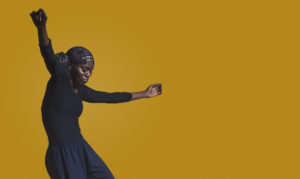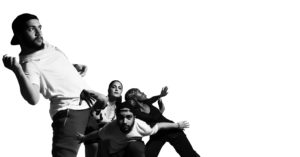Equity, Diversity & Inclusion in the Arts: A spotlight on IRIE! dance theatre
It is well-documented that individuals and communities from minoritized backgrounds are under-represented in the arts and culture sector and the impact of the pandemic is expected to exacerbate these inequalities. Despite the challenges, there are several trailblazing organisations addressing barriers to equity, diversity and inclusion in the sector through different aspects of their work. One such organisation, who we at Arts & Culture Finance (“ACF”) are extremely proud of having supported through social investment, is IRIE! dance theatre (“IRIE”). This blog shines a spotlight on the different ways IRIE translates commitment to diversity into action – from service design to impact measurement to incorporating user voice to representation in leadership and governance structures.

IRIE was founded in 1985 by Beverley Glean MBE with the aim of raising the profile of Black dance and dancers in Britain and creating a repertory of works reflective of the African Caribbean influence on Black British culture. In 2018, IRIE launched the BA (Hons) Degree in Diverse Dance Styles in partnership with the University of Roehampton. This is the first and only programme in the UK and Europe to focus on African and Caribbean dance styles and specifically addresses a gap in provision, as higher education dance programmes traditionally tend to focus on ballet and Western contemporary dance. IRIE’s mission is to give young people from diverse backgrounds the opportunity to see themselves and their culture reflected within the Higher Education system and to equip them with the skills and experience to forge a creative and fulfilling career in dance. IRIE is committed to engaging young people from non-traditional backgrounds who may not otherwise have engaged with Higher Education and many of their students are the first in their families to attend university. To enable this, IRIE spends considerable time and effort in generating awareness and providing additional support through coaching workshops where prospective students can get feedback and advice on their college applications and have the opportunity to ask questions and interact directly with past graduates and current students. IRIE proactively targets an underserved group and addresses barriers to inclusion thereby contributing to wider diversity goals in dance and in Higher Education.
IRIE has developed a pathway for engaging children and young people from an early age by delivering dance workshops in primary and secondary schools and in partnership with local youth centres. With the support of ACF’s Impact Manager, IRIE has developed a framework of monitoring and evaluation which measures impact on children and young people across a range of outcome areas such as increased engagement with education, employment or training; personal well-being; confidence and self-esteem as well as a better understanding of African and Caribbean dance forms and of Higher Education options in dance. Most importantly, this impact information is reviewed on a regular basis by trained staff to improve design and delivery of the workshops, thereby centering impact and the quality of user experience at the heart of their work.

Besides its work in dance education and training, IRIE has a community outreach programme which includes weekly workshops in dance and self-development specifically focusing on at-risk youth, low-cost weekly community classes in African dance, and a weekly dominoes club and quarterly vintage tea dances for older people from African and Caribbean backgrounds. The goal of the programme is to develop community cohesion and a sense of belonging in the ethnically diverse borough and continue the legacy of IRIE’s home at the Moonshot Centre in New Cross, Southeast London, which was rebuilt in 1979 after an arson attack, and which in 1981 became a base for the area’s African and Caribbean communities after the New Cross Fire, which sparked one of the biggest public demonstrations against racial injustice in British history.
But what is truly impressive about IRIE’s community outreach work is how dynamic and adaptive it is in responding to the changing needs of the community. For example, its Young Voices programme gives local young people a safe space to freely express what they would like to see more of at IRIE; and when they expressed interests as varied as gardening, cooking and running their own radio show, rather than dismissing these as being outside IRIE’s traditional area of expertise, the team is finding ways of incorporating them into the programme so that the young people feel truly heard and form an ongoing relationship with IRIE as a community hub where they can express themselves creatively (and not just through dance). Similarly, when IRIE staff heard parents who were attending online fitness classes during lockdown frequently talk about feeling overwhelmed by the demands of home-schooling, they started running Saturday schools to help alleviate the burden. The classes cover general studies, Maths, English, and also Black British history, particularly local Black British history along with creative classes on dance and drumming. In this way, IRIE is continually consulting with and including service users in the design and delivery of their programmes and services.
Finally, IRIE emphasises diversity and representation in its recruitment and governance practices as well. It is black and female-led, and the Board reflects both racial and generational diversity. The Board composition is frequently reviewed to ensure it is reflective of the changing composition of service users – for IRIE it is crucial that young people can see themselves in the leadership and power structures which shape key strategic decisions in the organisation. Given IRIE’s dual role as a community centre as well as a centre for Higher Education and that the staff engage daily with the local community, it is also important that people recruited to these roles themselves have links to the local community and demonstrate a strong understanding and commitment towards IRIE’s mission and values. IRIE also frequently employs past graduates as freelance artists, tutors and in administrative roles thus providing students with pathways into employment.
Thus, IRIE embodies principles of equity, diversity and inclusion in several key aspects of work such as targeting an underserved group, using impact data in service improvement, incorporating user voice in service design, ensuring representation in recruitment and governance practices; and work across these areas contributes directly to the achievement of their mission. Through future blogs, we hope to further explore these and other aspects of equity, diversity and inclusion that are helping organisations in our portfolio further their respective missions.
